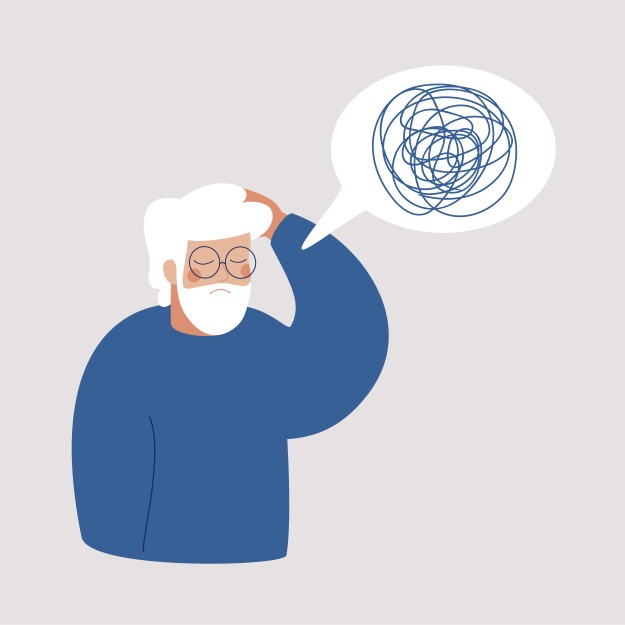
Join 1,000s of women in our pause. community
Get valuable information and support from our community and team of menopause specialists. Subscribe for the latest evidence-based information, free events, helpful articles and inspiring women’s stories.
Downloaded from www.mymenopausecentre.com
Direct URL: https://www.mymenopausecentre.com/blog/male-menopause-and-symptoms-everything-you-need-to-know/
The andropause - or more commonly known as 'the male menopause' - describes the age-related changes in male hormone levels. Here Dr Clive Morrison of the Centre for Men’s Health tells us everything you need to know about the andropause and ways to manage its symptoms.

To start off with, it’s worth knowing that while it may be known as ‘the male menopause’, men do not go through a direct equivalent of the menopause. Before we look at the andropause in men, it is useful to understand what happens for women and how this compares.
During the menopause transition, a woman will experience a significant drop in oestrogen levels. The menopause transition typically starts in a woman’s mid-to-late forties (known as the perimenopause) and the average age for the menopause in the UK is 51. During the perimenopause, oestrogen levels fluctuate wildly and decline significantly (causing many of the symptoms associated with the menopause). After the menopause (postmenopause) they settle down at these lower levels.
Most men who experience age-related testosterone health problems will see male menopause symptoms and signs during their late forties to early fifties, but they can start any time from the age of 30 onwards. So, there is no fixed ‘male menopause age’ or measurable point in time, like there is for women.
These changes can, as with the menopause, have significant negative health, wellbeing, quality of life and relationship impacts. There are a range of medical terms for the resulting condition, but it is increasingly known as Testosterone Deficiency (low testosterone). Testosterone Deficiency has a range of possible causes, age-related hormone change being one of these.
In men, testosterone is vital to the development and maintenance of male sexual characteristics and function. Normal active testosterone levels help to maintain sex drive and fertility in healthy men. Research is showing it also helps maintain psychological health. It is increasingly being recognised as important to a wide range of health-related areas in men. This includes contributing to maintaining healthy and active energy levels and preventing bone breakdown.
So, what are the symptoms of low testosterone in men? A number of these can be similar to those experienced by menopausal women, in particular, hot flushes and night sweats. However, not all men with low testosterone will experience these. The most common symptoms of Testosterone Deficiency are:
• Decreased sex drive (low libido)
• Erectile dysfunction (ED) and/or loss of morning erections
• Tiredness and a general loss of energy
• Depression and/or mood swings
• Weight gain, especially around the belly
• Poor concentration, short-term memory loss and ‘brain fog’
• Irritability
Testosterone Replacement Therapy (TRT) has been shown to be highly effective in relieving the symptoms of testosterone deficiency – in particular, in restoring energy, health and sex drive. TRT is usually given by testosterone gel, cream, or long-acting injections. It is often needed long-term and can safely be continued in these forms if good symptom relief is maintained or changed to other types if needed.
It’s natural for men’s hormone levels and balance to change as they age. Where this has no health impact, there is no need for treatment. However, where this change negatively impacts health, wellbeing or relationships, a trial of testosterone replacement treatment (TRT) should be considered in the same way as Hormone Replacement Therapy (HRT) would be where a woman’s health is being affected by the effects of menopause. In both cases, the fact that the problem can be the result of a ‘natural’ ageing process/the normal result of ageing is no reason on its own not to provide treatment any more than treating, for example, the consequences of osteoporosis or failing sight that often come with age. It’s increasingly clear from the research that where medically indicated, there are significant and wide-ranging benefits to be had from normalising testosterone levels in men with this condition.
Unfortunately, Testosterone Deficiency remains an underdiagnosed and undertreated condition. Research at the Centre for Men’s Health indicates that as many as 20% of men (2 million) across the UK over the age of 50 suffer from this condition. However, only 1% have been diagnosed and are being treated.
Greater awareness of the symptoms and the condition is needed. This is growing, gradually. To help with this awareness-raising, the Centre has a low testosterone screening questionnaire on its website which can help a man identify whether low testosterone may be an issue for them. Many patients have said to us that getting the results from this was what led them to realising what might be causing their symptoms. Also, and just as importantly, a more symptoms-led approach to diagnosis is also required, similar to that used to identify female patients who would benefit from HRT treatment. This is the approach used at the Centre for Men’s Health, alongside detailed blood testing of levels and other investigations.
Dr Clive Morrison is a highly experienced men’s health doctor at the Centre for Men’s Health. For over 25 years, the Centre has been at the forefront of treatment of men for low testosterone and connected issues such as ED. It provides treatment at clinics in both London and Manchester.
At the Centre, Dr Morrison is part of a team dedicated to using a holistic approach to providing the best care for its patients. As such, the clinic engages in an ongoing process of developing referral links with complementary practitioners and organisations that provide wider health support to men and their partners, including in areas such as diet and nutrition.

Whether you want to discuss your symptoms, create a treatment plan that's right for you, understand some test results or have a check-up, the highly experienced doctors and nurses in our menopause clinic are here to help you.
Book now
We’d love to hear from you
Please ensure you’re logged in to leave a comment. Not got an account – registration is quick and easy! All comments are moderated prior to being posted on the website and are subject to our Acceptable Use Policy.
Comments